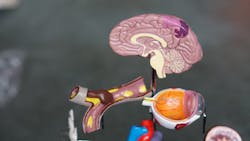Lab-grown ‘mini-brains’ suggest COVID-19 virus can infect human brain cells
A Johns Hopkins collaboration has demonstrated that the novel coronavirus, SARS-CoV-2, can infect and replicate within a human mini-brain model.
A multidisciplinary team from two Johns Hopkins University institutions, including neurotoxicologists and virologists from the Bloomberg School of Public Health and infectious disease specialists from the School of Medicine, has found that organoids (tiny tissue cultures that simulate whole organs) made from human cells (known as “mini-brains”) can be infected by the SARS-CoV-2 virus that causes COVID-19. The results were published in the journal ALTEX: Alternatives to Animal Experimentation.
Early reports from Wuhan, China, have suggested that 36 percent of COVID-19 patients show neurological symptoms, but until now it was not clear whether the virus infects human brain cells. The Johns Hopkins researchers have now demonstrated that certain human neurons express a receptor, ACE2, that the SARS-CoV-2 virus uses for entering the lungs — and possibly the brain.
When the researchers introduced SARS-CoV-2 virus particles into a human “mini-brain” model, the team found — for what is believed to be the first time — evidence of infection by and replication of the pathogen.
The human brain is well-shielded against many viruses, bacteria and chemical agents by the blood-brain barrier, which in turn, often prevents infections of the brain. “Whether or not the SARS-CoV-2 virus passes this barrier has yet to be shown,” notes senior author Thomas Hartung, MD, PhD, chair for evidence-based toxicology at the Bloomberg School of Public Health. “However, it is known that severe inflammations, such as those observed in COVID-19 patients, make the barrier disintegrate.”
The human stem cell-derived “mini-brain” models — known as BrainSpheres — were developed at the Bloomberg School of Public Health four years ago. They were the first mass-produced, highly standardized organoids of their kind, and have been used to model a number of diseases, including infections by viruses such as Zika, dengue, and HIV.

